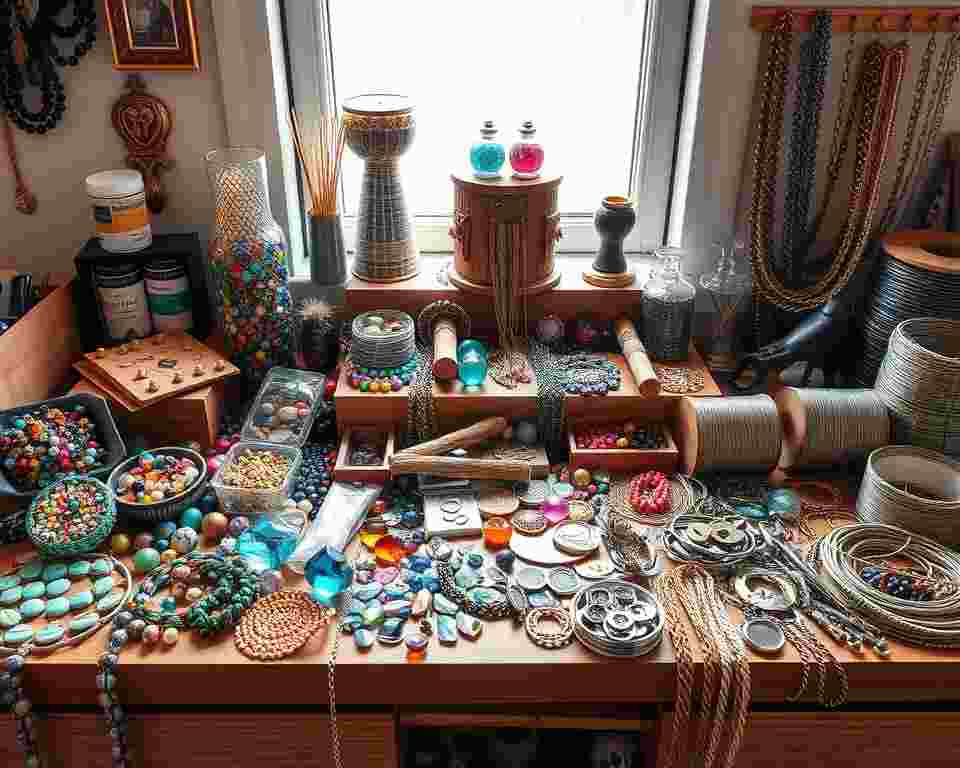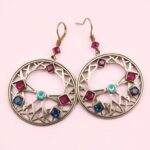Jewelry Business Ideas : Top Ways to Start & Succeed
The jewelry industry is brimming with opportunities for creative entrepreneurs who want to turn their passions and skills into profitable ventures. Whether you’re interested in crafting custom pieces, targeting specific niches, or building an online store, there are countless jewelry business ideas to explore. This versatile industry allows you to blend artistry with business, appealing to a wide range of customers who seek unique and meaningful adornments.
In this guide, we’ll look at the jewelry market, consumer trends, and profitable business ideas. We’ll cover how to understand the market, build your brand, manage your supply chain, and deal with legal issues. Our goal is to help you start and grow a successful jewelry business.
Let’s explore how to succeed in the jewelry world. With the right mindset, a good understanding of the market, and a solid plan, you can turn your love for jewelry into a profitable business.
Understanding Today’s Jewelry Market Landscape
As jewelry lovers and business starters, we need to understand the current jewelry market. We should look at the latest trends, market size, and who buys jewelry. This helps us make our jewelry business successful in today’s fast-changing world.
Current Consumer Trends and Preferences
Recently, the jewelry world has seen big changes in what people want. Millennials and Gen Z love jewelry that’s personal, made right, and good for the planet. They’re into simple designs, rings that stack, and jewelry that anyone can wear.
Market Size and Growth Potential
The global jewelry market is growing, with a 5% annual increase expected from 2022 to 2027. This growth comes from more money to spend, a love for luxury, and shopping online. Knowing this helps us make the most of the market’s growth.
Key Demographics for Jewelry Businesses
- Millennials and Gen Z: Younger buyers, 25-40, who want unique, ethically made jewelry.
- High-income individuals: People with money to spend on special, exclusive jewelry.
- Bridal and engagement market: Couples looking for special rings for their big day.
- Gift-givers: Those searching for meaningful jewelry gifts.
By matching our jewelry and marketing to what people want and who buys it, we can grow and make money in the jewelry market.
Essential Steps to Launch Your Jewelry Business
Starting a jewelry business needs careful planning. You might want an online store or a physical boutique. Let’s look at the key steps to start your jewelry business.
First, create a detailed business plan. It will help you make important decisions like who to sell to and what to sell. Do deep market research to know what people like and what makes your business special.
Then, build a strong brand that speaks to your customers. Choose a catchy name, design a logo, and create a look for your brand. This branding will help with your online store and marketing.
- Get the right licenses and permits to run your business legally. This might include a sales tax permit and a business license.
- Find money to cover startup costs like inventory and website development. Look into personal savings, loans, or crowdfunding.
- Work on your products, using quality materials and talented designers. Make sure your jewelry fits your brand and what your customers want.
- Set up a good supply chain and inventory system. This will help you run smoothly and meet customer needs. Building good relationships with suppliers is key.
By following these steps, you can launch a successful jewelry business. A solid plan and careful preparation are essential to make your business a reality.
Top Jewelry Business Ideas for Modern Entrepreneurs
The jewelry industry is always changing, offering many chances for new businesses. You can offer custom designs, focus on specific markets, or start online. These options let you find your own place in this exciting field.
Custom Design Services
Today, people want unique jewelry that shows their style. By offering custom designs, you meet this need. This approach makes your jewelry more valuable and builds a strong bond with your customers.
Specialized Niche Markets
Targeting specific markets can be very profitable. For example, eco-friendly or ethical jewelry is in high demand. Focusing on these areas lets you stand out and show your commitment to the environment and social causes.
Digital-First Business Models
With more people shopping online, starting a digital business is smart. Using Shopify, you can create a strong online presence. This way, you can reach more customers, save money, and keep up with trends easily.
The jewelry industry is full of chances for entrepreneurs. By being creative, meeting new needs, and using digital tools, you can make your jewelry business successful and fulfilling.
Building Your Jewelry Brand Identity
Starting a jewelry business means creating a strong brand identity. This is key to stand out in a busy market. Your brand helps build customer loyalty, sets you apart, and drives your success.
When picking a jewelry business name, choose something unique and memorable. It should reflect your brand’s essence. Avoid names that are too common or hard to remember. Instead, pick a name that speaks to your target audience and shows off your jewelry’s unique personality.
Design a logo that captures your brand’s essence. It should be eye-catching and show off your jewelry’s style. Think about adding symbols like gemstones or detailed metalwork to tie your brand to the jewelry world.
Creating a clear brand message is also vital. Write a compelling jewelry brand story that shows what makes you special. Talk about your design philosophy and commitment to quality. Make sure your message is the same everywhere, from your website to social media.
A strong brand identity attracts customers and builds a lasting connection with them. Remember, your brand is the heart of your jewelry business. So, invest time and resources to make it shine.
Online Platforms and Marketing Strategies
In today’s world, having a strong online presence is key for any jewelry business. The right online platforms and marketing strategies can help you reach your audience. Let’s look at how to boost your jewelry brand’s online visibility and sales.
Social Media Marketing Techniques
Social media is a powerful tool for jewelry brands. Instagram, Facebook, and Pinterest are great for showing off your designs and engaging with followers. Good social media marketing includes:
- Creating beautiful and inspiring images
- Working with influencers and experts
- Hosting giveaways and contests
- Quickly responding to customer comments
E-commerce Platform Selection
Picking the right e-commerce platform is crucial for an online jewelry store. Shopify, WooCommerce, and BigCommerce offer features and customization options. Look for platforms that are easy to use, mobile-friendly, and integrate payments well.
Content Marketing for Jewelry Brands
Good content can attract and keep customers for your jewelry brand. Consider a blog or video series on design, lifestyle tips, or gemstone education. Quality content helps build your brand’s reputation and drives store traffic.
| Online Platform | Key Benefits | Recommended for |
|---|---|---|
| Shopify | User-friendly, highly customizable, and scalable e-commerce solution | Jewelry brands looking for a comprehensive and feature-rich platform |
| Visually-driven social media platform ideal for showcasing jewelry designs | Jewelry brands targeting a younger, fashion-conscious audience | |
| YouTube | Video-sharing platform to create educational and behind-the-scenes content | Jewelry brands aiming to build a strong content marketing strategy |

Sourcing and Supply Chain Management
As jewelry entrepreneurs, finding reliable supplies and managing our supply chain is key to success. Whether it’s getting raw materials, working with wholesalers, or overseeing manufacturing, making this part of your business efficient can greatly impact your profits.
Establishing Relationships with Jewelry Suppliers
Having a network of trustworthy suppliers is the base of a good supply chain. It’s wise to research and check out several vendors to ensure quality and good prices. Look for those who specialize in what you need, like metals, gemstones, or components.
Negotiating with Jewelry Wholesalers
Building strong ties with wholesalers can also help you stand out. By negotiating better terms, like discounts or longer payment times, you can cut costs and boost profits. Always compare offers from different wholesalers to find the best deal.
Streamlining the Jewelry Manufacturing Process
Being efficient in making jewelry is crucial for quality and cost control. Invest in tools and equipment that make your work easier, like specialized tools or automated polishers. Also, think about outsourcing some tasks to experts to make your operations better.
| Jewelry Supplies | Jewelry Wholesalers | Jewelry Manufacturing |
|---|---|---|
|
|
|
By focusing on quality supplies, building strong wholesaler relationships, and improving our manufacturing, we can build a strong and efficient supply chain. This will help our jewelry business grow.

Pricing Strategies and Profit Margins
Starting a jewelry business means looking at pricing carefully. You want to make money while keeping prices fair. We’ll look at costs, pricing models, and how to price right for your business.
Cost Analysis and Pricing Models
Knowing your costs is key to success. This includes material, labor, and overhead costs. Also, indirect costs like marketing matter. A good cost analysis helps you set prices that make money and keep you competitive.
Maximizing Profitability
After understanding your costs, it’s time to think about making more money. You can use different pricing strategies. These include pricing based on how much you sell, offering bundles, or using tiered pricing. Each method works best for different products and customers.
Competitive Pricing Strategies
It’s important to watch what your competitors charge. Market research helps you price right. You can offer premium or value products, depending on what your customers want and your goals.
| Pricing Strategy | Advantages | Disadvantages |
|---|---|---|
| Cost-Plus Pricing | Ensures profitability, simple to implement | May not be competitive, doesn’t consider market dynamics |
| Value-Based Pricing | Aligns with customer perceptions, maximizes profits | Requires in-depth market research, may not be suitable for all products |
| Competitive Pricing | Maintains market share, can be attractive to customers | Profit margins may be low, can be difficult to sustain long-term |
Using these pricing strategies wisely helps your jewelry business succeed. It finds the perfect balance between making money and staying competitive.
Legal Considerations and Business Protection
Starting a jewelry business means you need to know the law. This is key to keeping your business safe and growing. We’ll look at the legal steps you must take.
Keeping your designs and brand safe is very important. You should register trademarks, copyrights, and patents. This stops others from using your work without permission. Knowing the laws about product safety and what you must tell customers is also crucial.
Getting the right insurance is another big step. General liability insurance protects you from lawsuits. Property insurance covers your stuff, like inventory and tools. Choosing the right insurance is a smart move.
By dealing with these legal issues early, you can grow your business with confidence. You’ll know your work, assets, and operations are safe. With a strong legal base, you’re ready to succeed in the jewelry market.
Key Legal Considerations for Jewelry Businesses:
- Trademark and copyright registration
- Compliance with industry regulations and safety standards
- Comprehensive general liability and property insurance coverage
Scaling Your Jewelry Business for Growth
As your jewelry business grows, it’s time to plan for lasting growth. This part talks about how to expand, enter new markets, and build a strong team. These steps will help your jewelry business reach new heights.
Expansion Strategies
To grow your jewelry business, think about offering more products. Add new collections, materials, or ways to customize. This will attract more customers and bring in more money. Also, look into selling through new channels like wholesale or pop-up shops to reach more people.
International Market Entry
The jewelry market is global. Think about selling your jewelry in other countries. Look into what customers like, tariffs, and shipping issues to plan well. Using online stores and partnerships can help you enter new markets and connect with customers all over.
Building a Strong Team
- Hire skilled artisans, designers, and production specialists to keep your jewelry quality high.
- Get experienced sales and marketing people to help your brand grow and engage customers.
- Invest in training to help your team grow and improve together.
- Make sure everyone knows their role and how to work together smoothly.
- Guest posts are a popular digital marketing strategy because they benefit both the guest author and the host site.
By using these strategies, you can set your jewelry business up for long-term success. Stay quick to change, keep innovating, and always put your customers first. This way, you’ll stay ahead in the competitive jewelry world.
In Conclusion
There are many profitable jewelry business ideas for entrepreneurs. These include custom design services, specialized markets, and digital-first models. The jewelry industry is full of opportunities for those who think creatively and adapt to new trends.
To succeed, jewelry entrepreneurs need to understand the market and stay updated on trends. They should also build a strong brand identity. Using online platforms, smart marketing, and efficient supply chains is key to a thriving business.
The secret to long-term success in jewelry is careful planning, being adaptable, and focusing on customer value. With the right strategies, aspiring entrepreneurs can build a profitable and sustainable business in this exciting market.
FAQ For Jewelry Business Ideas
Q1. Is jewelry business profitable?
Ans: Yes, the jewelry business can be highly profitable. The profitability depends on factors like your target market, product quality, pricing strategy, and branding efforts. With the right approach, such as focusing on niche markets or offering custom designs, you can achieve significant returns.
Q2. Which type of jewelry business is best?
Ans: The best type of jewelry business depends on your skills, resources, and target audience. Popular options include:
- Handmade Jewelry: Ideal for creative individuals, offering unique designs.
- Fine Jewelry: Focused on high-end materials like gold and diamonds, catering to luxury markets.
- Fashion Jewelry: Affordable and trendy pieces targeting younger audiences.
- Custom or Personalized Jewelry: Allows customers to create bespoke designs, offering a premium service.
Q3. How do I start a unique jewelry business?
Ans: To start a unique jewelry business:
- Identify a niche: Focus on specific styles, materials, or themes.
- Create a business plan: Outline your target market, budget, and marketing strategies.
- Learn the craft: Invest in skills or collaborate with artisans.
- Source materials: Find reliable suppliers for quality materials.
- Brand creatively: Build a strong brand with a memorable name and story.
- Market effectively: Use social media, influencer partnerships, and SEO to reach your audience.
Q4. What is the most sold type of jewelry?
Ans: Fashion jewelry, also known as costume jewelry, is one of the most sold types due to its affordability and accessibility. Other popular categories include personalized jewelry, engagement rings, and classic gold or silver pieces.
Q5. Is it expensive to start a jewelry business?
Ans: Starting a jewelry business can range from affordable to costly, depending on the type of jewelry you plan to sell:
- Handmade or fashion jewelry: Low startup costs (as little as $500–$1,000).
- Fine or luxury jewelry: Higher costs due to expensive materials and certifications.
Budgeting wisely and starting small can help manage expenses.
Q6. What kind of jewelry is in demand?
Ans: Jewelry trends often shift, but these types are consistently in demand:
- Minimalist designs: Simple and elegant pieces.
- Sustainable or eco-friendly jewelry: Made from recycled materials.
- Personalized pieces: Customized names, initials, or birthstones.
- Cultural or symbolic jewelry: Items with cultural significance or unique designs.
Q7. Which country is famous for jewelry?
Ans: Countries like India, Italy, and Thailand are famous for their jewelry craftsmanship. India is known for intricate gold designs, Italy for fine luxury jewelry, and Thailand for silver and gemstone pieces.
Q8. How do I succeed in jewelry business?
Ans: To succeed in the jewelry business:
- Offer high-quality, unique designs.
- Build a strong brand with a compelling story.
- Use social media to engage with customers and showcase your products.
- Understand market trends and adapt quickly.
- Provide excellent customer service.
- Network with suppliers, designers, and industry professionals.
Q9. Is starting a jewelry business easy?
Ans: Starting a jewelry business requires effort, planning, and creativity. While it’s not necessarily “easy,” it’s achievable with the right strategies, including market research, skill development, and leveraging online platforms for sales and promotion.













